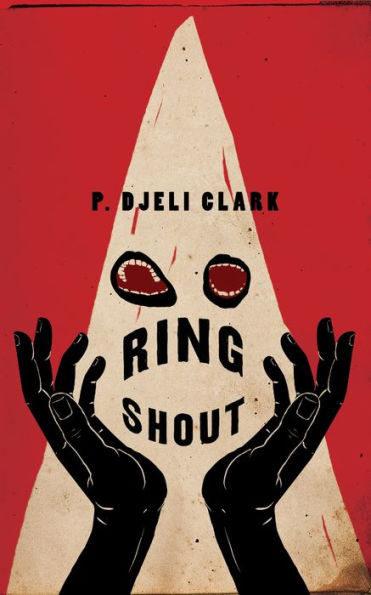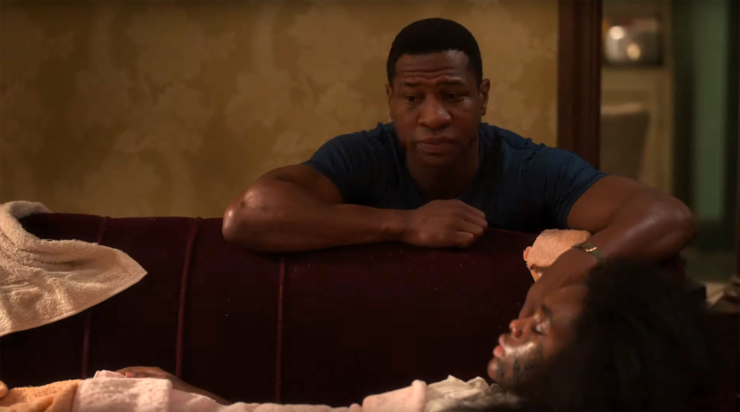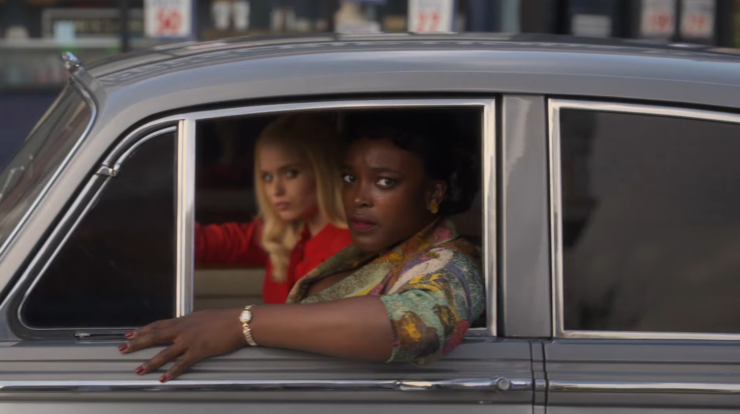The penultimate episode of Lovecraft Country calls on our heroes to face the horrors of white supremacy once more. This time there are no mutant shoggoths, just gleeful racist bloodthirst.
Dee is dying. Lancaster’s curse is slowly turning her into a pickaninny demon and the only thing left to leverage to get Christina to work some magic on Dee is Tic. Ruby summons her kinda-sorta-lover to the Freeman home, where she resets the spell. But she can’t remove it without Lancaster’s body—a body she later has access to and still chooses to do nothing helpful with. She takes pleasure in watching Lancaster die in agony, and Dee never even crosses her mind. As with Emmett Till, Christina’s “care” is all for show. Her interest only goes as far as getting her what she wants: Tic willingly going to Ardham for her autumnal equinox spell.
Montrose and Tic aren’t in a good place. The more the father tries to claw his way out of his pit of despair, the more dirt the son shovels in. As I’ve said before, Tic is a selfish man who positions himself in the center of everyone else’s tragedy, and so he reacts poorly to the news that he may actually be George’s son. For him, the complicated relationship and “unbreakable bond” between his elders is reframed as a personal attack against him. Frankly, I’m tired of his bullshit.
Buy the Book


Ring Shout
Hippolyta makes a surprise return from her own multiverse adventures. She is no longer the meek, put together matron but a disheveled, brilliant, and strong-willed woman. If anything, Leti has taken on the passive role. Gone is Leticia Fuckin’ Lewis. In her stead is a woman who trembles at her boyfriend’s rage. Ruby is right that Leti is doing what her mother did, chasing after an undeserving man at the cost of her own sense of self. But Ruby makes the wrong choice and leaves with Christina. I wish Ruby would do more than confront Christina. Christina is the snake in the Garden of Eden, offering Ruby her greatest desires with a sharp smile and a whole lotta lies.
Leti, Tic, Montrose, and Hippolyta pack up Dee in a desperate attempt to save her. At the observatory, Leti learns from Montrose that Tic already knows she’s pregnant and that he believes he’s going to die by Christina’s spell. Montrose also lets it slip that she’s having a boy. Hippolyta’s genius is unparalleled. She gets the broken portal working again and turns herself into a living motherboard to triangulate the door to Tulsa, 1921, the day of the massacre. The trio jump through into a hotel in the heart of Black Wall Street.
We have all those stories of time machines and people philosophizing about killing Hitler, but you know what? If I had a TARDIS, the first thing I’d do is go back and make sure the uprisings worked. I’d help John Brown, Denmark Vesey, Gabriel, Nat Turner, Jemmy, Charles Deslondes, and the countless others. I’d help the enslaved get to freedom and burn plantations to the ground. I’d destroy the Confederacy and save Emmett Till and my own ancestor who was lynched. Hell, I’d go back to the African kings and chiefs and try and cut off the slave trade before it even began. Fixing the terrors of the past for the chance to make a better future is worth the risk of me possibly ceasing to exist, paradox be damned.
If I were in Montrose’s shoes, I couldn’t treat time travel like adventure either. This is the night that broke him; he emerged from the wreckage an entirely different man. For Tic and Leti this is tourism, but Montrose is reliving the worst night of his life. When Montrose disappears, while watching his father Verton beat him for putting on George’s dress jacket and wearing a flower in his hair, Tic thinks he’s going to try and warn George. He and Leti split up, her heading to the Freeman house to locate the book and Tic to stop his father from changing the future. Once again, Leti finds herself running from white men in the dark, but this time she’s rescued by Verton. This also has the unintended side effect of being the spark that will eventually lead to the two houses being burned down.

At the park, Montrose and Tic watch young Montrose reject Thomas, the first boy he ever loved. Thomas is murdered by a white man and George and Dora are attacked when they try to rescue Montrose. It’s one more layer of guilt for Montrose. If he hadn’t run away to confront Thomas, maybe he might have been able to save his and Dora’s family. Let internalized homophobia and toxic masculinity push that one step further and we can see how Montrose might blame being gay for all of the terrible things that have happened to him.
As the fight gets worse, Tic realizes the children aren’t being saved by the mysterious stranger with the baseball bat. Until it becomes clear that it was Tic all along. Finally Tic can put his violence to good use. He did what Ji-ah and Leti have already done: take something bad and make something good out of it. Back at the house, Leti holds the hand of Tic’s great grandmother as the flames consume her. She is Shadrach, Meshach, and Abednego. She is a phoenix rising from the ashes. She is cleansed by fire and emerges from it powerful and wrathful. Hippolyta’s trials gave her the determination to name herself; Leti’s gave her the strength to withstand. She literally becomes her ancestors’ wildest dream.
Tic jumps through the shuddering portal as Hippolyta struggles to keep it open. For a brief moment, Montrose finds himself trapped and alone as his hometown burns in front of him. He feels helpless as the violence spreads. And then he spots Leti, marching through the devastation, Book of Names clutched to her chest. Hippolyta channels her power and love into keeping the portal open just long enough for Montrose and Leti to jump through.
Lovecraft Country has done a good job of putting Montrose’s queerness into the larger social context. Explaining why he made certain parental and marital choices, the formative experiences of homophobia that shoved him so deep in the closet he couldn’t find his way back out for decades, the way toxic masculinity broke his self-esteem and self-confidence. But we also have to talk about generational trauma, particularly with regards to racism and white supremacy. The Freeman family had been free long before the Emancipation Proclamation, but that doesn’t mean they were exempt from racism and racist violence.
We don’t know much about the people who lived between Hannah and Verton, but the Freemans might have remained in Massachusetts—possibly settling in New Bedford, which had more than 1,000 Black residents in the mid 1800s, nearly half of whom were people who escaped slavery. The Freemans probably relocated to Tulsa along with hundreds of other African Americans during the land rush period in the late 19th and early 20th centuries. By 1921, the Black population of Greenwood was about 10,000. This wasn’t just a thriving community; Greenwood was more or less its own city within a city.
Greenwood, like many Black-founded towns in the West, was intentional, not accidental. Early Black landowners provided safe harbor for new arrivals and sold them land for businesses and homes. Which makes its destruction even more devastating. This wasn’t simply white violence. It was a reaction against Black success and independence. It’s not hard to draw a line connecting the Tulsa Massacre to the vitriol at African American children attending white schools to modern day conservatives who have built whole political platforms based solely on undoing the achievements of Black politicians.
The Freeman family, like every other African American family, has carried centuries of violence, torture, abuse, and exploitation on their backs. Some are able to set those weights down and move forward to create a better future. Others are not. Verton takes his rage and social impotence out on his children. He is a brutal man and a mean drunk. There is nothing excusable about his abuse, but it is understandable. Sure, he may just be an asshole, but we can’t ignore the external forces pressing down on him. He passed his own trauma onto his sons, setting Montrose onto a path where he behaves just like his father and George on one where he is too afraid to intervene.
The goal of both brothers is safety. George protects by caring for his brother after the violent outburst while Montrose protects by trying to make himself and his son tough enough to survive the violence. Neither realize the violence shouldn’t happen in the first place. But how could they when violence—from their father and from white Tulsans—had such an outsized impact on their lives? George was able to convince himself he shed his demons, but really he only put them in a box and ignored them. Montrose, carrying the dual burdens of keeping his identity a secret and being unable to process the years of abuse, could not. The weight was too great, and for most of his life it left him shattered and hollow. Hopefully now that he has confronted his past he can lay down that load and become the kind of man his son and grandson need him to be.

Cultural texts referenced
- The Tulsa Star published a detailed article about the Williams Dreamland Theater earlier this year. The one thing I’d add is that the reason the Williamses and the other Black families couldn’t get the insurance to pay for their ruined properties was because Tulsa was recorded as a riot, and riot damage was not covered by insurance.
- Sonia Sanchez’s poem “Catch the Fire.”
- The people and places recalled by Montrose: Peg Leg Taylor and Standpipe Hill; H.L. Byars’ tailor shop was located at 105 N Greenwood; Dr. A. C. Jackson was a prominent, nationally renowned Black doctor who was shot to death; Merrill and Ruth Phelps; Commodore Knox died later in the hospital and is believed to be the last victim of the massacre. I couldn’t find anything on “Mrs. Rogers’ invalid daughter.”
Final thoughts
- “I was on Earth 504. And I was there the equivalent of two hundred years. On this earth, I could name myself anything. Infinite possibilities that came with infinite wisdom, and I’m gonna use all of it to save my daughter. Now get in the fucking car.” Yes ma’am!
- The line about Ruby wanting to be a redhead is a reference to Matt Ruff’s book.
- The mental gymnastics everyone is going through to not talk about Leti being pregnant is truly bizarre to watch. The only reason I can see for keeping the baby a secret is so we get the reveal at the end of this episode. A whole lotta work for very little reward.
- Do Leti and Tic still not realize how much that birthmark looks like something from the language of Adam?
- “…he will be my faith turned flesh.”
- Ruby goes off with Christina despite knowing that she wouldn’t help Dee without a trade for Tic’s life. I don’t know if Ruby thinks she’s siding with the winning team or is gullible enough to trust Christina, but I’m not happy about her choice.
Alex Brown is a librarian by day, local historian by night, author and writer by passion, and an ace/aro Black woman all the time. Keep up with her on Twitter, Instagram, and her blog.










